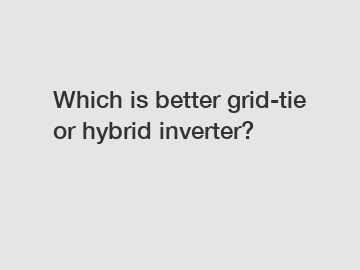Jan. 15, 2024
Energy
Which is Better: Grid-Tie or Hybrid Inverter?
When it comes to solar power systems, one of the critical decisions that homeowners and businesses need to make is choosing between grid-tie or hybrid inverters. Both options have their advantages and disadvantages, making it essential to consider your specific needs and circumstances. In this article, we will delve into the differences between grid-tie and hybrid inverters and help you decide which one is better suited to your requirements.
Grid-Tie Inverters.

A grid-tie inverter, also known as a grid-connected or on-grid inverter, is a device that converts the direct current (DC) generated by solar panels into alternating current (AC) for use in powering electrical appliances. The main feature of a grid-tie inverter is that it is connected to the utility grid, allowing excess solar energy to be fed back into the grid and potentially earn credits or compensation through net metering.
1. Advantages of Grid-Tie Inverters.
- Higher Efficiency: Grid-tie inverters are designed specifically to maximize the yield of solar panels, ensuring that the power generated is used efficiently.
- Lower Cost: Since grid-tie systems do not require battery storage, they tend to be more cost-effective than hybrid inverters.
- Easy Installation: Grid-tie inverters are relatively straightforward to install and require less complex wiring compared to hybrid inverters.
- Net Metering: These inverters allow users to earn credits or compensation for the excess energy they generate, which can help offset electricity bills.
2. Considerations for Grid-Tie Inverters.
- Dependency on Grid: Grid-tie inverters rely on an uninterrupted power supply from the grid, so if there is a power outage, the system will shut down for safety reasons.
- Excess Solar Energy: While the ability to feed energy back into the grid can be beneficial, it may not be suitable for regions that have limited net metering programs or low electricity rates.
- Lack of Backup Power: Grid-tie inverters do not provide backup power during grid outages since they are designed to shut down when the grid is down.
Hybrid Inverters.
Hybrid inverters, as the name suggests, offer a hybrid solution by combining the functionalities of grid-tie inverters and off-grid inverters. These inverters can work both in a grid-tied mode, allowing excess energy to be stored in batteries, and in an off-grid mode, providing backup power during utility outages.
1. Advantages of Hybrid Inverters.
- Energy Independence: Hybrid inverters provide the freedom to utilize solar energy both during grid-connected times and in off-grid scenarios, offering a higher degree of energy independence.
- Backup Power: With battery storage, hybrid inverters can offer backup power during grid outages, ensuring critical appliances or systems can still function.
- Load Shifting: Hybrid inverters allow users to shift energy usage from peak times to off-peak hours, leveraging lower electricity rates and reducing overall energy costs.
2. Considerations for Hybrid Inverters.
- Higher Cost: Hybrid inverters, due to their additional battery storage capabilities, are more expensive than grid-tie inverters.
- Complex Installation: The installation process for hybrid inverters is more involved and may require specialized knowledge and expertise.
- Battery Maintenance: Hybrid inverters with battery systems necessitate regular maintenance and periodic replacement, which adds to the overall system costs.
Closing Thoughts.
In conclusion, the decision between a grid-tie or hybrid inverter depends on various factors, such as your energy requirements, budget, and grid reliability. If you prioritize lowering costs and have a reliable grid, a grid-tie inverter might be the better choice. However, if you seek energy independence, backup power, and more control over your energy usage, a hybrid inverter with battery storage offers greater flexibility. .
If you need assistance in choosing the right inverter or require further information, please do not hesitate to contact us. Our team of experts will be happy to provide guidance and help you make an informed decision.
Want more information on low voltage lithium battery for remote monitoring systems, School hybrid storage inverter, Power output of lithium storage battery? Feel free to contact us.
If you are interested in sending in a Guest Blogger Submission,welcome to write for us!
All Comments ( 0 )